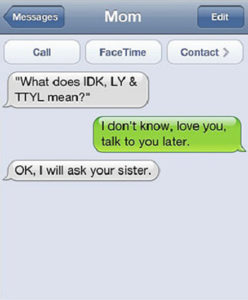
27 Jan A New Challenge: Sight Translating Texts and Social Media
This article by Jennifer de la Cruz was originally published in August 2014. We thought it was especially relevant after Athena’s piece on sight translation.
This is a new aspect of what we do in court interpreting. When Facebook and Instagram and even text messaging were new around here, not many of the folks I interpreted for on a daily basis were fans. In fact, it wasn’t until recently that I started to notice a surge of non-English social media messages and texts being presented as evidence in court, especially as part of informal hearings. The challenge of personal messages is taken to the next level with abbreviated text, quick quips, rapid-fire exchanges, and selfies to boot.
 Dealing with this can be difficult, depending on who presents the evidence and under what circumstances.When I work on a case where the party introducing the evidence is represented, there is at least some hope that the message in question will have its proper translation all neatly prepared ahead of time. This is the more formal hearing type. In less formal hearings where parties appear without representation, the offending Facebook post or text message is often brought up last minute on somebody’s cell phone. I’m then expected to quickly understand the abbreviations, undertones, and context since informal hearings are often about immediate issues of safety and potential loss of freedoms. Surely I’m not the only one who has noticed how difficult it can be to accurately render such language and meaning into everyday English.
Dealing with this can be difficult, depending on who presents the evidence and under what circumstances.When I work on a case where the party introducing the evidence is represented, there is at least some hope that the message in question will have its proper translation all neatly prepared ahead of time. This is the more formal hearing type. In less formal hearings where parties appear without representation, the offending Facebook post or text message is often brought up last minute on somebody’s cell phone. I’m then expected to quickly understand the abbreviations, undertones, and context since informal hearings are often about immediate issues of safety and potential loss of freedoms. Surely I’m not the only one who has noticed how difficult it can be to accurately render such language and meaning into everyday English.
What do our ethics say about sight translation in general? We are told to take the time to read and understand, and to ask for a break or recess if we need to look things up. Such a request is probably expected with documents that have some degree of length or formality, but even a short series of messages interspersed with sarcasm, insults, disguised threats, and the lot, often reach far beyond our ability to meet the perceived expectation to quickly begin sight translating.
I have never seen an entry in a training manual that deals with how to handle double meanings, misspellings, shorthand, and sarcasm in a text message or as part of a status update. I’m sure our judicial officers would appreciate the time savings if we could jump right in without missing a beat when a teeny-tiny text message needs to be rendered into English, but in order to truly capture meaning we may need to go back a few messages just to get the context.
This new trend raises a lot of questions that are truly worth taking pause to ponder: If we are asked to just sight translate just one message out of many in a thread, is there a nice, succinct way to explain our need for more context? How should we stop between messages to note the change in speaker? Is it considered proper to hold the phone ourselves? How to best call attention to the informal nature of abbreviations or common misspellings, if at all? Are there suggestions we could make to a judicial officer about better conditions for an accurate performance? How flexible should we be and where do we draw the line to prevent ourselves from becoming advocates?
Now that’s something worth discussing. What say you?
 Jennifer De La Cruz first became interested in learning Spanish in her college years, earning a Bachelor’s Degree in Spanish with an emphasis in linguistics from California State University at Fullerton. While interpreting and translating for the healthcare field, she earned certifications as a Court Interpreter for both the California and Federal Courts, later accepting a staff position with the California Trial Courts. Her passion for the Spanish language has become a thriving and satisfying career both in the fields of interpreting and translation, while her professional posts have allowed her to specialize in the highly challenging fields of law and medicine.
Jennifer De La Cruz first became interested in learning Spanish in her college years, earning a Bachelor’s Degree in Spanish with an emphasis in linguistics from California State University at Fullerton. While interpreting and translating for the healthcare field, she earned certifications as a Court Interpreter for both the California and Federal Courts, later accepting a staff position with the California Trial Courts. Her passion for the Spanish language has become a thriving and satisfying career both in the fields of interpreting and translation, while her professional posts have allowed her to specialize in the highly challenging fields of law and medicine.
Images credit:
1- Digital Parenting: http://www.digitalparenting.ie/text-speak-for-parent.html
2- https://yourmomhasafacebook.files.wordpress.com

Thank you, Jennifer, for another lesson and for opening our eyes to the need to learn this new “language.” I always thought it was only used in written format, but I am now hear people say L-O-L as if it were a real word. Strange…
Hi Jennifer, I really appreciate your post. As an interpreter in a court for a district with a very large population of Spanish speakers, I am faced with these questions/dilemmas several times a week. In contentious Restraining Order hearings for which both parties are present, I ask for time from the judge to review the messages beforehand so I can at put them in order, figure out who the senders are, and attempt to decipher them. This is the case when they have been printed beforehand and I am handed the photocopies by the parties.. Although I’m tempted to ask for assistance from the senders, I usually don’t because I don’t want to be swayed by any translations that an interested party to the hearing may make. As you indicated, these messages can be very difficult to sight translate. An excellent article on the challenges presented by text messages and Facebook posts was written by my colleague Pilar Cal-Meyer and appeared in Proteus Newsletter in the summer of 2016, Volume XXX, No. 2. It is titled: “Decoding and Constructing Meaning from Text Messages: Pragmatic Considerations for Court Interpreters. I keep a copy handy in case I am before a doubtful and impatient judge!
Constance, could you provide a link to this earlier article? Having to sight translate text messages, on the spot, is becoming more and more common in domestic violence court and in small claims court, when there is rancor between opposing parties. I have seen this recently in landlord- tenant dispute and child support courts.
Constance has provided the information you seek, but no link is available: Proteus Newsletter in the summer of 2016, Volume XXX, No. 2. It is titled: “Decoding and Constructing Meaning from Text Messages: Pragmatic Considerations for Court Interpreters.”
This is a very good point, a very real challenge.
During a murder trial, I was asked to interpret BBM messages in court where the guy says “Te mato” to the girl. When my sight translation comes out “I’ll kill you,” the English-speaking prosecutors jump all over it as if it’s a smoking gun, whereas that’s something we say in Spanish every day to spouse, kids, coworkers, you name it, whenever we’re even mildly ticked off.
But I was in a quandry, as I was being asked to sight translate the words, not provide a cultural background for the usage. Anyone have a suggestion on how to handle that type of a situation?
@Nicholas, if it is an idiomatic expression, I would render it as the intended meaning. For example, in one Latin American Country, they use “flaca” as a term of endearment, meaning “sweetheart”. So, if I were to stumble onto flaca, I would render it as sweetheart. So in your case, “te mato” seems to be as prevalent as “I love you” in the US, to the point where it has become more of an idiomatic expression. In Brazilian Portuguese, we have the expression “você vai ver o que é bom pra tosse” literally, “You will see what is good for coughing”– which means nothing in English! That may best be rendered as “You will get what is coming to you!” I do not know what was meant in your utterance, so it is hard for me to make a suggestion. Can you tell us what the intended message was? From what you say, I’d guess “I will get you.”
Hello all,
I’ve encountered the same dilemmas with my colleague in our courts. I was asked once to sight translate from the petitioner’s phone her texts messages, when I ask the judge indulgence to check the texts, I realized they were about 30 of them, realizing this, I told the judge that I believe these texts messages should have been translated ahead of time, due to the amount and also because it would be very time consuming. We can’t seat and do this kind of work because all the problems (that you all mentioned above) we can encountered. Judge agreed and rescheduled. Now another problem we are encountering with that is that there are several folks out there that think that because they are bilingual, they can translate these texts messages, poor LEP litigants are paying for these translations and they are not properly translated, technically and grammatically, they don’t have the proper training (well, there is little or maybe no training in text messages translations). I’ve gone to seminars to get well trained about transcripts/translations, but we yet have to see what should we do with this growing need to translate text messages.
I will try to get the Pilar Cal-Meyer Newsletter but my colleague said she tried to get it last week and she couldn’t. If there is another article or case law that anyone knows that talks about this sort of thing please let us know. We will greatly appreciate it.
I’ll echo what Jen is saying: context, context, context.